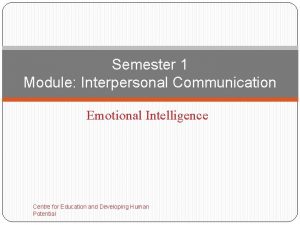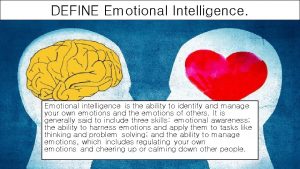Emotional Intelligence SOUTHWESTERNCONSULTING COM Emotional Intelligence SOUTHWESTERNCONSULTING COM







































- Slides: 39

Emotional Intelligence SOUTHWESTERNCONSULTING. COM

Emotional Intelligence SOUTHWESTERNCONSULTING. COM

Discussion Questions – What would other people who are close to you say regarding your self-awareness? – When was the last time you had a personality conflict with a coworker or client and how did you resolve it? – Have you ever lost a sale due to the social environment not being conducive to a buying environment? – Rate yourself on a scale from 1 to 10 regarding your EQ? Why? SOUTHWESTERNCONSULTING. COM

Discussion Principles – People don’t care how much you know until they know how much you care. (Empathy) – Selling is not telling. Selling is listening and asking great questions. – Selling is a transference of emotions. SOUTHWESTERNCONSULTING. COM

Emotional Intelligence Emotional intelligence (or EQ) allows you to connect with others at an emotional level that leaves them knowing that you care about them and have connected with them. • Two sets of emotions involved: your own and the buyer People buy because they like and trust you, and at it’s core, selling is a transference of emotions. SOUTHWESTERNCONSULTING. COM

Understanding your brain And how it processes information As you use your 5 senses to process the world around you, that information travels through different parts of the brain. • Signals begin at the spinal cord, travel through the limbic system and arrive at the frontal lobe. • Before you process anything rationally, you first experience it emotionally. • EQ requires effective communication between the emotional and rational centers of your brain • This skill can be taught! SOUTHWESTERNCONSULTING. COM LIMBIC SYSTEM (emotions) FRONTAL LOBE (rational thinking) SPINAL CORD (signals enter here)

Understanding your brain EQ is the ability to be aware of and manage your own emotions as well as the emotions of others. • Self Awareness Self-Awareness Social Management EQ • Social Awareness • Self Management • Social Management SOUTHWESTERNCONSULTING. COM Social Awareness Self-Management

Emotional Intelligence If you are able to manage your own emotions about closing the sale and truly listen to the buyer, you’ll be able to hear what the buyer is actually telling you. Top Producers are masters of the four parts of EQ. The key to EQ is to constantly seek improvement. “It doesn’t matter what you say to someone. All that matters is how you make them feel. ” -Spencer Hays SOUTHWESTERNCONSULTING. COM

The Four Parts of EQ Self-Awareness SOUTHWESTERNCONSULTING. COM

Self-Awareness Strategies for seeking Self-Awareness Observe your feelings with a neutral point of view. • Remember that your emotions do not determine who you are as a person – the way you react to them does. SOUTHWESTERNCONSULTING. COM

Self-Awareness Strategies for seeking Self-Awareness Discover who or what pushes your buttons. Start a journal and focus on your emotions. • Journaling helps you process your emotions more effectively. Think about why you do and don’t do certain things. • Are there activities you really enjoy and seek out and others that you avoid? Part of self-awareness is knowing what those are. Learn what your values are. • Values are your deepest desires for you how want to behave. SOUTHWESTERNCONSULTING. COM

Self-Awareness Strategies for seeking Self-Awareness Constantly seek feedback. • Ask others who know you well about what you are like and how you come across. Those close to you see things you may not. • Conduct a Self-Awareness Interview Notice how you react under pressure. • Do you talk faster or fidget? Being able to manage your emotions under stress is an invaluable resource. Use self-assessment tests. • The Navigate test includes an evaluation of your strengths and weaknesses. Another good resource is Strengths Finder 2. 0 by Tom Roth. SOUTHWESTERNCONSULTING. COM

Self-Awareness The Self-Awareness Interview Pick three to five people that you are fairly close with who will be extremely honest with you. 1. What do you see as my strengths in my everyday life and business? 2. What are my weaknesses in my everyday life and business? 3. What do you think my blind spots are regarding my selfawareness? 4. What are things that people can depend on from me? 5. What are things that people can’t depend on from me? 6. How do you think I make people feel in social and business environments? 7. Are there any situations you know of where I’ve lacked empathy? SOUTHWESTERNCONSULTING. COM

Self-Awareness In Your Sales Presentation In order to build self-awareness of how you come across to buyers during the sales cycle, it’s important to record your presentation and perform a self-evaluation. Get in the habit of recording and watching yourself – you will see exponential improvement. Recording will help you take note of your unconscious actions. You may not be aware of something you say or a nervous habit you have while presenting. SOUTHWESTERNCONSULTING. COM

Self Awareness In your Sales Presentation 6 Methods of Self-Awareness for your Presentation 1. Watch your video on mute. • Allows you to notice gestures you use during your presentations. 2. Watch your video with your back to the screen. • Allows you to listen to your vocal variety and how you use intonation. 3. Watch your video in fast forward. • Easier to pick up and notice nervous or annoying gestures. SOUTHWESTERNCONSULTING. COM

Self-Awareness In your Sales Presentation 4. Watch your video in normal speed. • Allows you to see how the entire presentation comes together. 5. Survey the audience after your presentation. • Allows for immediate feedback. 6. Ask your manager or a peer to watch the presentation. • Seeking feedback provides you will valuable insight on what you do well and what could use improvement. SOUTHWESTERNCONSULTING. COM

The Four Parts of EQ Self-Management SOUTHWESTERNCONSULTING. COM

Self-Management is using your self-awareness to manage your emotions and determine your actions. Managing yourself is about taking the time to put your best self forward. • This is determined by your preparation! SOUTHWESTERNCONSULTING. COM

Self-Management Putting it into Practice Step back and wait. • A huge part of self-management is not reacting immediately. Take the time for self-reflection and wait to make a decision or to respond. Practice focusing on your breathing if you’re in a stressful situation. Sleep on it if possible. Schedule time to work through your problems. • Worrying is a waste of time because it doesn’t fix anything. If you build time into your schedule to work through problems you’re currently trying to solve, you can avoid worrying about those problems outside of that assigned time. Schedule down time. • Schedule time to recharge: go to the gym, plan a date night, make time to watch a movie. Any activity that you find helps you recharge should be scheduled on your calendar with the same importance that you would treat any client-facing meeting. SOUTHWESTERNCONSULTING. COM

Self-Management Putting it into Practice Spend time focusing on your strengths. • Once you’re aware of your strengths and what brings you the most satisfaction, your time is well spent focusing on those things at which you excel. Surround yourself with people who are good at your weaknesses. • You don’t want to spend time worrying about your weaknesses, but you can take steps to improve in areas that might affect your quality of life or business. Establish good morning and evening routines. • Take time for yourself at the beginning and end of each day. Meditate, journal or practice other self-awareness activities. • Completing the same routine each night signals your body that it’s almost time for bed and makes falling asleep easier. SOUTHWESTERNCONSULTING. COM

Self-Management Putting it into Practice - Visualization Practice positive self-talk and visualize your goals. • Taking the time for positive self-talk can change the pathways in your brain to think the way you choose. • Taking the time to visualize achieving your goals will help rewire your brain to make them possible. Visualization Steps: • Close your eyes and think about your goal • Imagine yourself achieving that goal • What will be happening when you achieve that goal? • Write it down, draw a picture or map out a diagram as another way to visualize SOUTHWESTERNCONSULTING. COM 1. What will achieving my goal look like? 2. What will it feel like? 3. What will it sound like? 4. What will it smell like? 5. What will it taste like?

Self-Management Putting it into Practice Talk to someone who is a neutral party. • If you are actually dealing with a problem, it’s important to seek out advice from someone who is not as emotionally invested in the situation. This person might be able to provide a point of view that you would otherwise have missed. Accept that change is a part of life. • Life can be difficult. Self-management can be choosing to accept that problems will arise. If you can change your mindset to be accepting of these challenges as a part of life, it will be easier to manage your emotions during these situations. SOUTHWESTERNCONSULTING. COM

The Four Parts of EQ Social Awareness SOUTHWESTERNCONSULTING. COM

Social Awareness is recognizing others’ moods, reactions and emotions. Developing a high EQ means being able to sense what other people are feeling and noticing where they might be coming from in a situation. Recognizing your own emotions in a situation and managing those emotions will give you a clearer head a better ability to recognize the emotions of others. • This means more than listening to their words. You need to take note of their nonverbal cues and put yourself in their shoes. SOUTHWESTERNCONSULTING. COM

Social Awareness Steps to developing your Social Awareness Listen. • This is more than just listening to the words someone is saying. • Body language, tone, etc. • Be an active listener – make eye contact, nod, ask questions, get clarification, repeat their words back. Consider the person’s situation. • Put yourself in their shoes. Consider their motivations and fears. SOUTHWESTERNCONSULTING. COM

Social Awareness Steps to developing your Social Awareness Be aware of your surroundings. • Sometimes there is more to a situation than what you first notice. Is there anything going on with the group dynamic? Are you in a distracting setting? If you’re on the phone, what is going on in the background? What does the person’s tone of voice tell you? Practice People watching. • • What are they wearing? How are they carrying themselves? What is their emotional state? Do they appear introverted or extroverted? SOUTHWESTERNCONSULTING. COM

Social Awareness Steps to developing your Social Awareness Improve your capacity for empathy. • Empathy requires you to relate to another person’s situation without judgement. Remember names and use them. • As soon as you meet someone, repeat their name in conversation and ask if they have any nicknames. • Associate the person with someone you know who has the same name. • Use word association. If their name has an alternate meaning like a place or object, think of those as you repeat their name back to them. • If you know you’re going into a meeting with some people you don’t know, ask for a list in advance. Write them down. Look them up on the company website or Linked. In beforehand. SOUTHWESTERNCONSULTING. COM

Social Awareness Steps to developing your Social Awareness Understand that everyone plays by different rules. • The key to relating to others is to treat them how they want to be treated, not how you want to be treated. • Sit back and observe as much as possible. How does the person interact with others? How do they show appreciation? • Ask questions and get to know them better. This might be best done outside of an office or meeting setting. SOUTHWESTERNCONSULTING. COM

How Do You Empathize With a Question At it’s core, EQ is empathy and being considerate of others. Put EQ into practice by listening. • Instead of waiting for time to say the next thing on your mind or recite the next part of your sales presentation, it’s important to slow down and listen to what the person you’re talking to is asking. SOUTHWESTERNCONSULTING. COM

How Do You Empathize With a Question 1. First ask yourself in what emotional state is this question being asked? • There are six basic emotions: Happiness Sadness Anger Fear Disgust Surprise 2. Repeat the question back to them. • Acknowledges you’re actually listening • Have time to craft the best answer by taking the rest of the steps 3. What is the best next step for them to further their mission? • Your answer should be based on helping them move forward. SOUTHWESTERNCONSULTING. COM

How Do You Empathize With a Question 4. Look at your surroundings and notice who else can hear you. • Re-ask yourself the question from their point of view. Sometimes your answer isn’t just about the person asking it. You need to consider the missions of the other people who are listening. 5. Create an answer that considers all of these factors. SOUTHWESTERNCONSULTING. COM

The Four Parts of EQ Social Management SOUTHWESTERNCONSULTING. COM

Social Management is the ability to navigate relationships and social situations. By managing your own emotions and being aware of the emotions of others, you can strategize to make the best of any situation. This is especially important in a selling environment. SOUTHWESTERNCONSULTING. COM

Social Management Becoming a Master Strategies in mastering Social Management Foster Relationships Focus on your communication strengths, but don’t ignore your weaknesses. • Your Self-Awareness Interviews and your Navigate assessment can help you determine what your communication style is. Be polite. • Think about how often you say “please”, “thank you” or “I’m sorry”. If it’s not often, work on incorporating them into your relationships – both personal and business. SOUTHWESTERNCONSULTING. COM

Social Management Becoming a Master Tell the truth. • Authenticity is one of the foundations of building trust. • Mean what you say. Accept what you cannot change and adapt. • Difficult people and situations will happen. They can’t be avoided but they can be improved upon. Control the controllables. • You can control some aspects of any situation. • Identify what those are and come up with a plan. • Sometimes, the controllables are the logistics and sometimes it’s your own attitude. SOUTHWESTERNCONSULTING. COM

Situations and Solutions Situation Self. Awareness Self. Management Social Awareness Social Management You’re making a cold call and have the decision maker on the phone. It doesn’t seem to be going well. You know you have a tendency to speak faster and louder when you think someone isn’t listening. You take a breath and pause before deciding how to proceed. You notice the decision maker’s tone is tense and there is a child crying in the background. You offer to call them back in 20 minutes and give them time to handle the situation at home. SOUTHWESTERNCONSULTING. COM

Situations and Solutions Situation Self. Awareness Self. Management Social Awareness Social Management You have a sales presentation scheduled for a prospect with six attendees. Two of them have been negative so far and seem to feed off of each other when they are together. You know you’re good at answering objections, but it’s challenging when there are two people constantly being negative. You own your ability to answer objections well. Practice answering the objections you have heard so far and anticipate any others. Work them into your presentation before they come up. Recognize that there will be some negative people in your presentation and put yourself in their shoes. Are they afraid of change? Are they having trouble seeing the value in your product or service? Plan out your presentation and come up with a seating chart that places the negative prospects at different ends of the room so they won’t be able to feed off each other. SOUTHWESTERNCONSULTING. COM

Action Items SOUTHWESTERNCONSULTING. COM

EQ Action Items Conduct a Self-Awareness interview with at least three people you can trust Record your appointment-setting and selling presentations and send them to your coach. Practice empathizing with questions. Review the recommended reading: Emotional Intelligence 2. 0 by Travis Bradberry and Jean Greaves SOUTHWESTERNCONSULTING. COM
 Bài thơ mẹ đi làm từ sáng sớm
Bài thơ mẹ đi làm từ sáng sớm Cơm
Cơm Emotional intelligence in hrm
Emotional intelligence in hrm Aptimore coaching
Aptimore coaching Emotional intelligence training materials
Emotional intelligence training materials Conclusion of emotional intelligence
Conclusion of emotional intelligence Ihhp eq test
Ihhp eq test Interpersonal communication and emotional intelligence
Interpersonal communication and emotional intelligence Emotional intelligence index
Emotional intelligence index High emotional intelligence
High emotional intelligence Emotional intelligence ppt
Emotional intelligence ppt Emotional flooding
Emotional flooding What is emotional resilience in social work
What is emotional resilience in social work Evolution of emotional intelligence
Evolution of emotional intelligence Oka emotional intelligence
Oka emotional intelligence Emotional intelligence definition
Emotional intelligence definition Tows mátrix példa
Tows mátrix példa Bag technique procedure
Bag technique procedure Emotional intelligence happiness
Emotional intelligence happiness Evolution of emotional intelligence
Evolution of emotional intelligence Goleman's four domains of emotional intelligence
Goleman's four domains of emotional intelligence Emotional intelligence speaker
Emotional intelligence speaker Global leadership foundation emotional intelligence test
Global leadership foundation emotional intelligence test Advantages of emotional intelligence
Advantages of emotional intelligence Emotional intelligence journal
Emotional intelligence journal Objectives of emotional intelligence
Objectives of emotional intelligence Blueeq emotional intelligence
Blueeq emotional intelligence Attitude and emotional intelligence
Attitude and emotional intelligence Master aptitude emotional intelligence
Master aptitude emotional intelligence Emotional intelligence presentation
Emotional intelligence presentation Emotional root of prejudice example
Emotional root of prejudice example Socially maladjusted vs emotional disturbance
Socially maladjusted vs emotional disturbance Discuss schema theory ib psychology
Discuss schema theory ib psychology Emotional appeal examples
Emotional appeal examples What is love tank
What is love tank Emotional affirmation
Emotional affirmation Tucker turtle takes time to tuck and think video
Tucker turtle takes time to tuck and think video Mechanical barriers to communication
Mechanical barriers to communication Glittering generalities advertising
Glittering generalities advertising Joaquin phoenix your honor
Joaquin phoenix your honor



























































